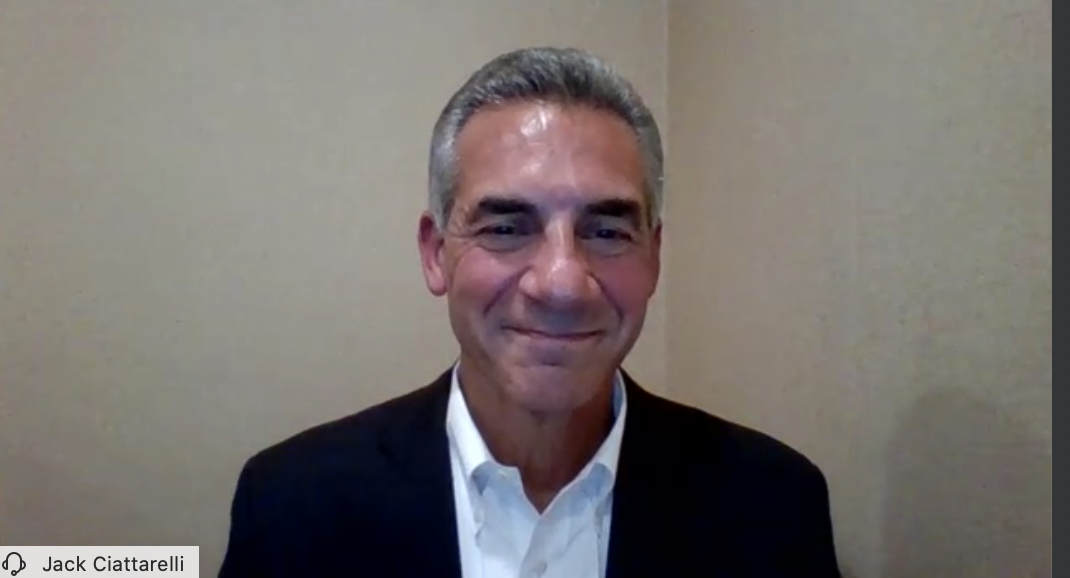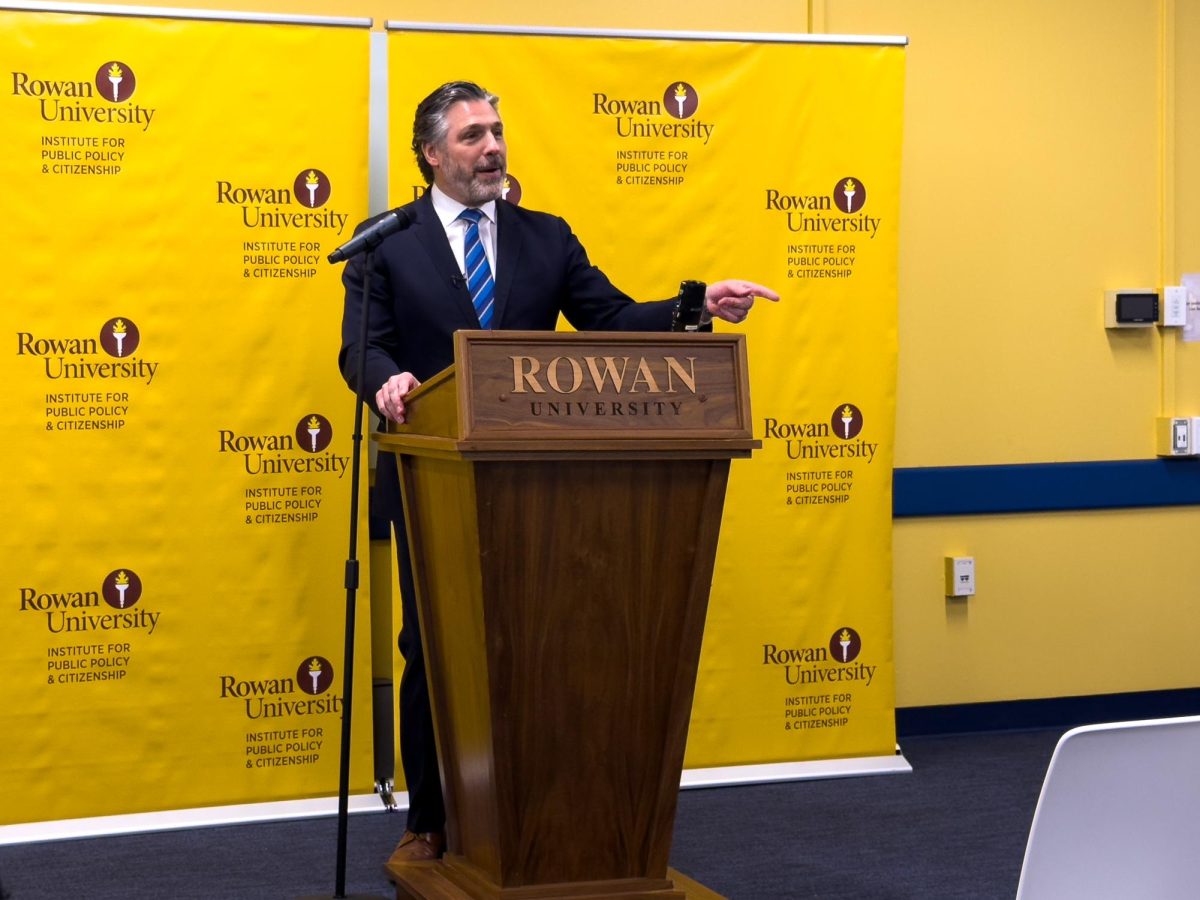The Rowan Institute for Public Policy & Citizenship (RIPPAC) hosted an online panel with Republican gubernatorial candidate Jack Ciattarelli, giving guests a chance to ask him questions before the Nov. 2, 2021 election. Dr. Benjamin Dworkin, the director of RIPPAC, presented the items of discussion to Ciattarelli.
Ciattarelli previously served on the Raritan Borough Council, and the Somerset County Board of Chosen Freeholders, and was sworn in as a member of the New Jersey General Assembly in January 2012.
He ran for the New Jersey governor position in 2017 as well but was unsuccessful. Outside of politics, Ciattarelli started and operated two medical publishing companies.
“By historical standards, I declared early, 20 months in advance of the election. If I’ve learned anything since the last run, seven months is not nearly enough time to get up and down this very large, but small, state of ours,” Ciattarelli said about his previous election.
Ciattarelli cited some well-covered issues facing the state as his reason for running again in 2021.
“We have the worst property taxes in the nation — this isn’t rhetoric or hyperbole. We also have the worst business climate in the nation. We have the second-worst public pension problem in the nation. Those three issues paralyze us economically,” Ciattarelli said. “It’s the reason why, despite the fact we do an excellent job at graduating K-12 students from our public and private schools, those that go out of state to college, the fewest come back compared to the other 49 states.”
Dworkin highlighted some obstacles that Ciattarelli faces in the coming election. For example, current New Jersey Gov. Phil Murphy spends significant personal resources to campaign. There are also currently about a million more registered Democrats in New Jersey than Republicans.
“It’s easy to forget that our state, when it comes to gubernatorial elections, is really purple with a tint of red. If you look at the last four decades, no incumbent Democratic governor has been re-elected. Not Jim Florio, not Jim McGreevey, not Jon Corzine. Every one of our governors served two terms during that period. We’ve controlled the executive branch more than the Democrats in the past four decades,” Ciattarelli said in response.
While Ciattarelli’s history of New Jersey’s gubernatorial campaigns is right, he still faces a significant challenge in the growing number of registered Democrats in New Jersey.
“While it’s easy to focus on just the number of Republicans and Democrats, it’s easy to forget, though I never do, that the majority party in New Jersey are the 2.4 million independent voters that lean right. Those are the ones that ultimately dictate the outcomes of state-wide elections,” Ciattarelli said.
Ciattarelli was incorrect in this statement, with the majority party being Democrats not unaffiliated voters. According to the most recent New Jersey Statewide Voter Registration Summary, Democrats hold the lead with 2,498,976 voters; a 136,907 lead over the 2,362,169 unaffiliated voters, but about a million over Republicans.
Regarding campaign finance, Ciattarelli stated that he and Gov. Murphy would participate in the state-match program, limiting the amount of campaign spending to $16 million.
“I believe you can get it done with $10 million; we’ll have $16 [million] for the general, and that’s more than enough to win the general election. I think if you look at the difference between what Bob Hugin spent last year compared to Bob Menendez, it didn’t translate to a victory. It’s not just about the money; candidates matter,” Ciattarelli said.
Dworkin asked Ciattarelli to elaborate on his approval or lack thereof of President Donald Trump and his outlook on the future of the Republican party.
“I think the leaders of the day are the ones that define what that party stands for at that point in time. What we are seeing in this era is very different from previous Republican presidents,” Ciattarelli said. “We are in an era right now where people like friction, they like heat, they like confrontation.”
Ciattarelli expressed his belief that Trump’s policies work on a national level, particularly regarding China, the Middle East, border security, the economy, and conservative judges’ appointments. However, he stated that his support for the president comes second to the needs of New Jersey.
“As the governor of New Jersey, I’ve got to advocate for our 9 million citizens, and there are things on which I disagree with the president. And so I want our SALT [state and local tax] deduction back in New Jersey,” Ciattarelli said.
In addition to his opposition to a cap on SALT deductions, Ciattarelli noted two other points of contention that he would bring to the president as governor of New Jersey. One is a request for the government to help fund the “Gateway Project,” the third rail tunnel under the Hudson River. The other is to prevent off-shore drilling in the Garden State’s waters.
When asked about the state’s response to COVID-19, Ciattarelli extensively scrutinized Gov. Murphy’s decisions.
“I think we were all behind the governor, in terms of rising to the occasion to save lives and meet this challenge. There’s a whole lot more we know,” Ciattarelli said. “I think the governor, quite frankly, has overdone it by repeatedly extending the state of emergency and continuing to govern by ‘fiat’ with executive order after executive order, with little to no input or role from the legislature. Our democracy in New Jersey has been hijacked.”
Dworkin also asked Ciattarelli to speak on how his administration would help create more economic development, particularly in South Jersey.
“As governor, I will re-establish the Department of Commerce, which kinda dissolved under Corzine and Christie. I will rename it as the ‘Department of Commerce and Economic Development.’ Its commission will be a cabinet-level position, and reporting in will be three deputy commissioners,” Ciattarelli said.
According to his plan, the three deputy positions would be in the north, central, and southern New Jersey regions.
“I’m open to all ideas in South Jersey, including the Glassboro-Camden line. That’s critically important for economic development,” Ciattarelli said. “We’ve got to be careful, many times we talk about economic development, and we get excited because a company is moving to Camden City. If no one lives in Camden City, you’re not going to have the kind of vitality we all want for South Jersey.”
RIPPAC’s next guest will be the Attorney General of New Jersey, Hon. Gurbir Grewal, on Wednesday, Oct. 14, 2020, at 7:00 p.m. To attend the virtual event, you must RSVP at go.rowan.edu/Grewal by Oct. 9.
For comments/questions about this story, email [email protected] or tweet @TheWhitOnline.

























































































































































!["Working with [Dr. Lynch] is always a learning experience for me. She is a treasure,” said Thomas. - Staff Writer / Kacie Scibilia](https://thewhitonline.com/wp-content/uploads/2025/04/choir-1-1200x694.jpg)
















































